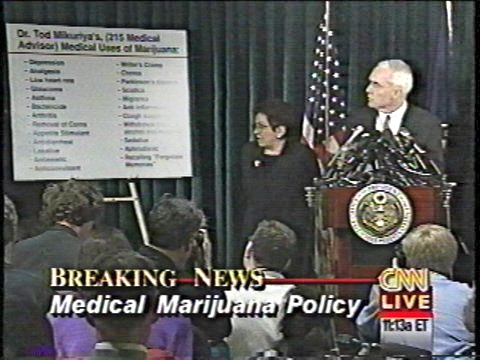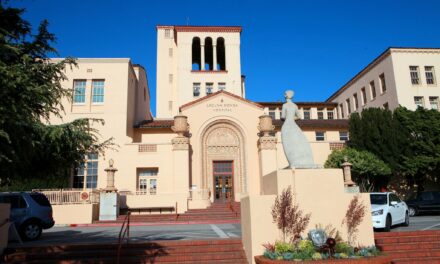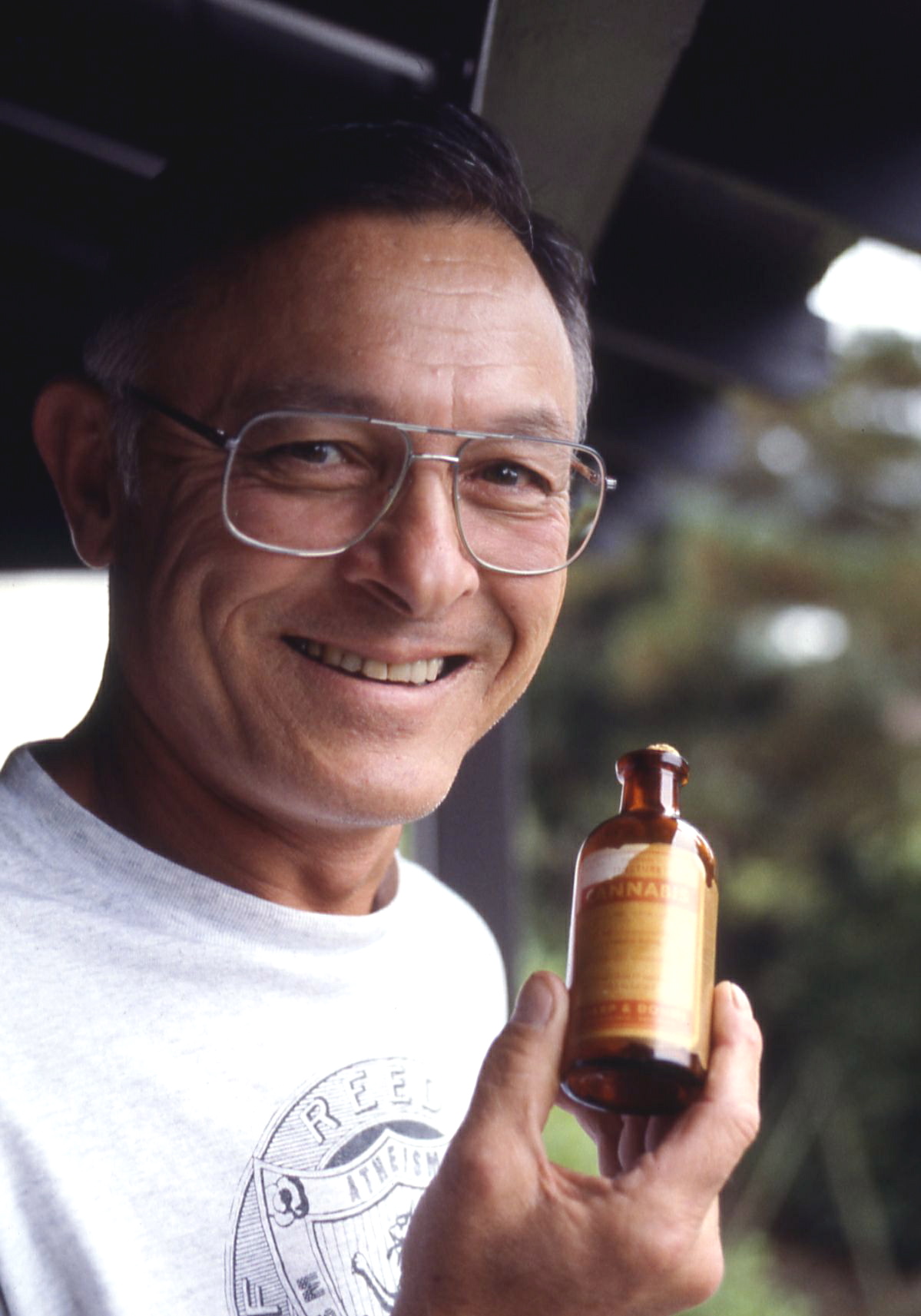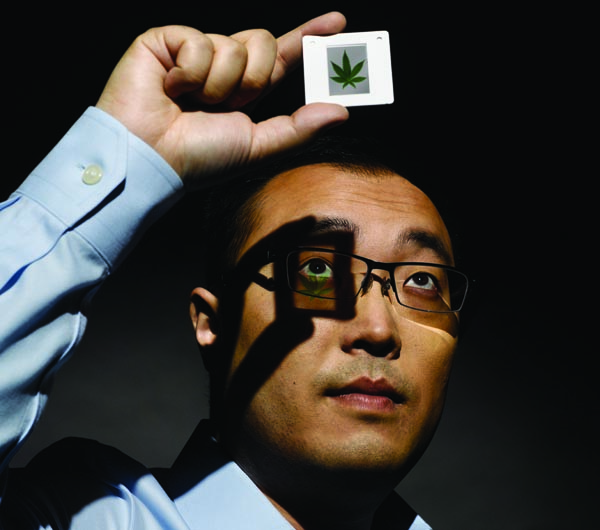On December 30, 1996 –20 years ago today and less than two months after Bill Clinton was returned to the White House and California voters passed Proposition 215– CNN broadcast a press conference at which Drug Czar Barry McCaffrey, flanked by Attorney General Janet Reno and Health & Human Services Secretary Donna Shalala, reiterated the Administration’s opposition to the medical use of marijuana. Alan Leshner of the National Institute of Drug Abuse was there, too.
The key visual element was a large chart on an easel to the speakers’ right. The heading read “Dr. Tod Mikuriya’s, (215 Medical Advisor) Medical Uses of Marijuana:” (sic content and punctuation). Twenty-six conditions were listed in two columns of 13. One of the conditions was misspelled — “Migranes.” Another, “Writer’s Cramp,” simply does not appear in the extensive list of conditions Mikuriya had advised Cannabis Buyers Clubs to be tracking.
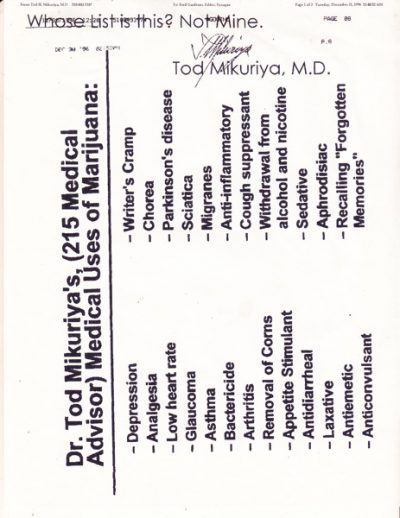
Mikuriya, watching on TV, taped the press conference on CNN and faxed a photo of the bogus chart with the comment, “Whose list is this? Not mine.”
The day after the press conference, med student Mark Tanaka and I drove up the hairpin curves to interview Dr. Mikuriya at his house in the Berkeley Hills. Flashback 20 years to an account in the Anderson Valley Advertiser of Mikuriya’s response:
Mikuriya, a 63-year-old psychiatrist, calls the McCaffrey chart “a crude dirty trick —the kind of disinformation the U.S. military put out during the Vietnam War. Only in this case the ‘enemy’ is the people of California.”
As Shalala gazed Vannalike at the chart and nodded agreement, McCaffrey told the media, “This isn’t medicine, this is a Cheech and Chong show.” The drug czar warned that the use of marijuana violated federal law and would lead to reprisals, including the loss of prescription-writing privileges for any doctor who recommended it to patients. Reno said that prosecutors would focus on doctors who were “egregious” in recommending marijuana.
Mikuriya felt directly threatened. In a New Year’s Day interview at his home in the rain-drenched Berkeley hills, he analyzed the set-up. “As doctors become more fearful, I’ll obviously get more and more patients who are using cannabis or are considering it. Will that make it seem that there’s something ‘egregious’ about my practice?”
Tod Mikuriya, MD, is a graduate of Reed College and the Temple University School of Medicine. He practices psychiatry in Oakland. (His office is in the grand old Claremont Hotel.) He has been studying the effects of marijuana since 1966, when he directed the first-ever National Institute of Mental Health research project on the forbidden herb. He is considered a leading authority on the pre-prohibition medical literature. In recent years Mikuriya has served as medical advisor to Cannabis Buyers Clubs in San Francisco, Oakland, Santa Cruz and Marin County, and has interviewed several hundred members.
After Proposition 215 won at the polls in November, Mikuriya prepared what he calls “a protocol for buyers clubs,” asking staffers to collect data on efficacy and dosage from as many members as possible. The Oakland club and several others immediately adopted Mikuriya’s protocol. It lists 62 conditions which Mikuriya figures people may now be treating with marijuana. “If the data from these people is not properly compiled,” Mikuriya warns, “a historic opportunity will have been lost.”
Mikuriya says he sent a copy of his proposed buyers club protocol to McCaffrey in mid-November, hoping that the Clinton Administration would view the election results as a sign to rethink its prohibitive approach to medical marijuana use. “What’s saddest and most ominous,” Mikuriya said, “is that the Director of the Drug Control Office and the Attorney General are not willing to challenge this new law on the basis of what it says. They could have chosen a condition that they consider to be in some gray area—say, insomnia, or colitis—and questioned the appropriateness of marijuana as a treatment. But instead they chose to make up some ludicrous falsehoods. I suppose I should take it as a sign that they understand the weakness of their position.”
Mikuriya has retained Gordon Brownell, a St. Helena attorney who likens his client’s situation to the plight of Richard Jewell after the FBI revealed that he was suspected of planting a bomb at a park near the Olympics last summer. “In that case the government had a defense of sorts,” Brownell observes, “in that Jewell actually was a suspect, and the Atlanta Journal found out and printed it. But in this case we have a chart created at the White House for the apparent purpose of misleading the public and shaming a physician.”
Where It Came From
The chart was prepared for McCaffrey by an aide in the Office of Drug Control Policy named David Des Roches. No jokes, please, he’s heard them all. Des Roches his source was a version of Mikuriya’s “Marijuana Medical Handbook,” available on the Internet at http://206.61.184.43/schaffer/hemp/mjmedhb.htm. The 10-page document includes “every use in recorded history of marijuana for medical purposes,” Des Roches said in a Jan. 3 phone interview with your correspondent
Des Roches defends the identification of Mikuriya as “215 Medical Advisor” because, as advisor to the San Francisco Cannabis Buyers Club, Mikuriya has had a working relationship with Dennis Peron, the initiative’s primary organizer. “Back here in Washington,” Des Roches explained, “we see Prop 215 and the Cannabis Buyers Club as one and the same, the link being Mr. Peron.”
Des Roches is a West Point graduate who spent nine years as an Army officer before taking early retirement. His title in the Drug Czar’s office is “Special Assistant for Strategy;” his informal role is “the Internet specialist.” Des Roches says he culled conditions from Mikuriya’s “Handbook” with an eye towards “showing how ludicrous some of them were.” Of the reference to “writer’s cramp,” Des Roches adds “I had to show that one to General McCaffrey because nobody believed it.”
Des Roches’s chart transforms the voice and tense in which Mikuriya’s “Handbook” was drafted. For example, Des Roches’s entry “Recalling ‘forgotten memories'” is shortened from Mikuriya’s “John Stuart Mill suggested using cannabis for the recall of forgotten memories.”
Des Roches’s “Corn Removal” derives from Mikuriya’s “Concentrated cannabis resin is topical anesthetic. Applied directly to a nerve, the electrical impulses are inhibited. It was mentioned as used on dental cares for treatment of pain. Prior to removal from the market it was combined with salicyclic acid, a proteotic agent, and collodion to keep it in place for callus removal on feet.”
Upon learning the origins of McCaffrey’s chart, Mikuriya said, “There was nothing in that document to suggest that I was recommending marijuana as a treatment for any given condition. The effect, and probably the intent, was to hold me up to ridicule before the whole country. The whole world.” Mikuriya has drafted a letter to McCaffrey demanding an apology. “I want my name cleared at a press conference as widely covered as the original press conference,” Mikuriya asserts. “And I want to hear an apology from Director McCaffrey himself.”
Attorney Brownell commented, “When Pierre Salinger said it was friendly fire that brought down TWA flight 800, the federal government and all the pundits reminded everyone that the Internet was a notorious source of misinformation. Now they take something off the Internet, change it, and use it to humiliate a physician who has actually spent years studying the literature and collecting data on this subject. It’s outrageous.”
San Francisco District Attorney Terence Hallinan expressed extreme disappointment over the Clinton Administration’s strategy. “It’s as if Dan Lungren had designed their response,” Hallinan said Jan. 4. “Apparently they want to make buyers clubs illegal, period.” On Monday, Jan. 13 Hallinan plans to announce protocols developed by the city Health Department under which buyers clubs can operate legally in this city “in the interests of harm reduction.”
Dennis Peron’s line on the McCaffrey press conference: “Good publicity for Cheech and Chong. On Jan. 8 the founder and maitre ‘d of the San Francisco Cannabis Buyers Club returns to Superior Court to argue that the passage of Proposition 215 changes the law under which his Market Street establishment was ordered closed back in early August, and that he should be allowed to reopen forthwith. Judge David Garcia will have read the briefs from each side and will rule from the bench after hearing some more from Peron’s attorney, J. David Nick, and a lawyer from Attorney General Lungren’s staff. Ever the optimist, Peron has announced plans to begin registering members Jan. 15, and to reopen the club under a new name, “The Phoenix,” on Jan. 20.
PS December 30, 2016: If only the newly re-elected Bill Clinton had said, “The people of California have sent the government message, they want to allow the medical use marijuana. We’ll be watching closely to see what impact this new approach might have on public health and safety…” the Democrats would not have lost the White House in 2000 —or 2016. But they were and are in thrall to Big PHARMA. —Fred Gardner

